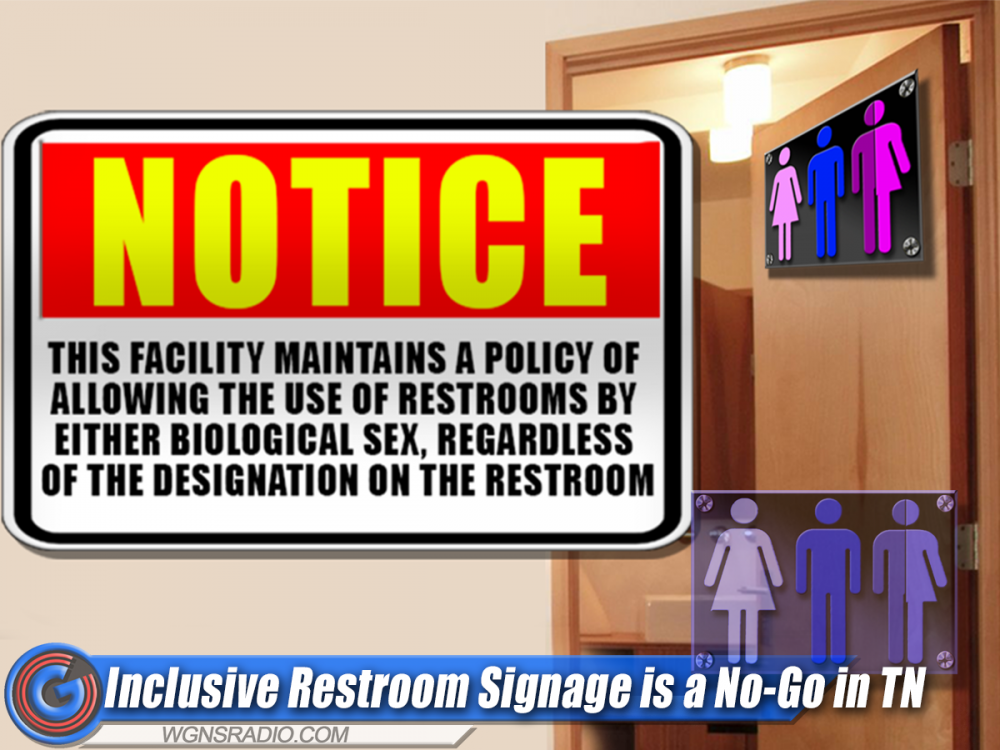The ACLU has announced their opinion on a federal judge striking down a Tennessee law on Tuesday (May 17, 2022) that required businesses and other entities that allow transgender people to use the public restroom that matches their gender to post a government-prescribed warning sign.
In an email to WGNS Radio on Tuesday afternoon, ACLU of Tennessee executive director Hedy Weinberg stated, “We applaud the court for recognizing that this law violates the First Amendment and harms transgender people.” Weinberg went on to say, “Transgender individuals should be able to live their lives free of harassment and discrimination. Today’s decision ensures that the businesses who welcome them are not forced to become instruments for politicians’ discrimination.”
Last year, Governor Bill Lee signed a bill to require businesses and government offices to post signage "if" they allowed customers / residents to use their restroom, changing room or locker room based on the gender they "related to." The legislation thus made Tennessee the first state to require public facilities to be marked with inclusive signage. House Bill 1182 went into effect on July 1, 2021. However, a lawsuit filed on behalf of Bob Bernstein and his Nashville restaurant called Fido, argued that such signage would be stigmatizing. 8-Days after the new sign regulations were to go into effect, the courts agreed to a preliminary injunction. Almost a full year later, the courts moved to strike down the law permanently (See the complete filing HERE).
Bernstein stated, “As a former journalist, I believe strongly in free speech.” He said, “The government can’t just force people to post discriminatory, inaccurate, and divisive signs in their places of business. I am glad that the court recognized that this law violates the First Amendment.” See the complete filing HERE.
If the law were to have been fully implemented, then businesses and buildings with public restrooms would have been required to post signage with the word “NOTICE” written in yellow on a red background at the top, followed by text stating, “THIS FACILITY MAINTAINS A POLICY OF ALLOWING THE USE OF RESTROOMS BY EITHER BIOLOGICAL SEX, REGARDLESS OF THE DESIGNATION ON THE RESTROOM,” or potentially face criminal charges.
Past Transgender Restroom issues in Tennessee: In 2016, President Barack Obama attempted to install a mandate requiring all public schools to have signage on restrooms allowing for children to use the restroom of their choice. What was ultimately a directive by President Obama instructed all public schools to allow transgender students to use the bathroom that matches their gender identity, as opposed to their gender from birth.
Directives are basically a suggestion of the results an administration would like to achieve, giving lawmakers in each state the freedom to choose how they impose the issue into law, if at all. Some of the states that failed to achieve the transgender bathroom signage in schools received a brief reprimand while others faced letters and complaints filed by a handful of organizations.
Closer to home, Rutherford County Schools Public Information Officer James Evans stated in May or 2016, "Rutherford County Schools does not plan to change its procedures or policies as a result of the advisory letter that was sent last week by the U.S. Department of Education to all school districts in the country. Our governor has also issued a statement and said that school districts should continue serving the individual needs of students and that the advisory letter is not an enforceable law." Evans further elaborated on the issue 6-years ago… "Our school district already works with students and their families on an individual basis to resolve these types of issues, which are extremely rare, and the school district plans to continue doing so in a manner that serves the best interests of all students involved and does not disrupt the school environment or other students. To date, we have been able to resolve these issues while being in compliance with the guidance we have received from the federal and state levels."
That same year in nearby Sumner County, the ACLU filed a complaint with the U.S. Department of Education's Office for Civil Rights regarding the Sumner County Schools' policy that prohibits transgender students from using restrooms corresponding to their gender identity.
Directives are basically a suggestion of the results an administration would like to achieve, giving lawmakers in each state the freedom to choose how they impose the issue into law, if at all. Some of the states that failed to achieve the transgender bathroom signage in schools received a brief reprimand.
Despite multiple states opposing such directives, only one state passed legislation restricting access of multiuser restrooms and locker rooms to those who were born one sex, yet related to the opposite. North Carolina approved legislation stating that the restroom used by one person verses another, should be chosen by whatever sex the bathroom user was assigned at birth, also referred to as biological sex restrooms. The bill was later repealed.
The TN Bill Requiring Inclusive Restroom Signage: In 2017, Tennessee was one of 16-states that considered passing legislation that would sex-segregate restroom or locker room usage to the biological sex that a user was assigned at birth. 4-Years later, Governor Bill Lee signed a bill to require businesses and government offices to post signage "if" they allowed customers / residents to use their restroom, changing room or locker room based on the gender they "related to." The legislation thus made Tennessee the first state to require public facilities to be marked with inclusive signage. House Bill 1182 went into effect on July 1, 2021.
TN HB 1182: Public Buildings - As enacted, requires a public or private entity or business that operates a building or facility open to the general public to post a notice at the entrance of each public restroom of the entity's or business's policy of allowing a member of either biological sex to use any public restroom within the building or facility, if the entity or business maintains such a policy.






